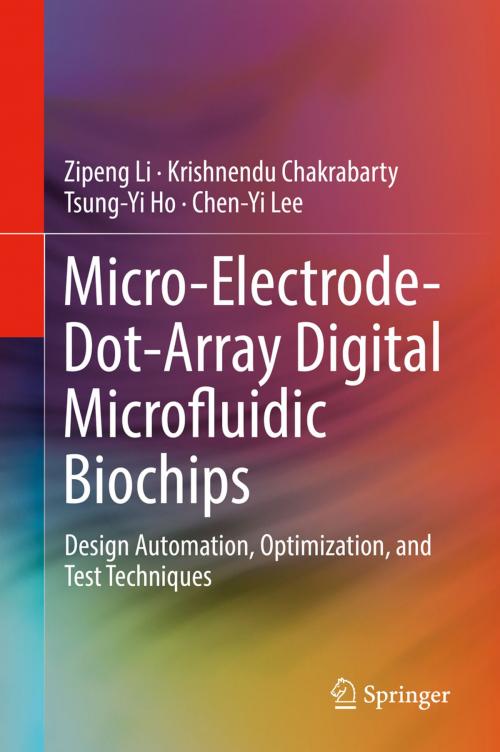Micro-Electrode-Dot-Array Digital Microfluidic Biochips
Design Automation, Optimization, and Test Techniques
Nonfiction, Science & Nature, Technology, Electronics, Circuits, Engineering| Author: | Zipeng Li, Krishnendu Chakrabarty, Tsung-Yi Ho, Chen-Yi Lee | ISBN: | 9783030029647 |
| Publisher: | Springer International Publishing | Publication: | December 14, 2018 |
| Imprint: | Springer | Language: | English |
| Author: | Zipeng Li, Krishnendu Chakrabarty, Tsung-Yi Ho, Chen-Yi Lee |
| ISBN: | 9783030029647 |
| Publisher: | Springer International Publishing |
| Publication: | December 14, 2018 |
| Imprint: | Springer |
| Language: | English |
This book provides an insightful guide to the design, testing and optimization of micro-electrode-dot-array (MEDA) digital microfluidic biochips. The authors focus on the characteristics specific for MEDA biochips, e.g., real-time sensing and advanced microfluidic operations like lamination mixing and droplet shape morphing. Readers will be enabled to enhance the automated design and use of MEDA and to develop a set of solutions to facilitate the full exploitation of design complexities that are possible with standard CMOS fabrication techniques. The book provides the first set of design automation and test techniques for MEDA biochips. The methods described in this book have been validated using fabricated MEDA biochips in the laboratory. Readers will benefit from an in-depth look at the MEDA platform and how to combine microfluidics with software, e.g., applying biomolecular protocols to software-controlled and cyberphysical microfluidic biochips.
This book provides an insightful guide to the design, testing and optimization of micro-electrode-dot-array (MEDA) digital microfluidic biochips. The authors focus on the characteristics specific for MEDA biochips, e.g., real-time sensing and advanced microfluidic operations like lamination mixing and droplet shape morphing. Readers will be enabled to enhance the automated design and use of MEDA and to develop a set of solutions to facilitate the full exploitation of design complexities that are possible with standard CMOS fabrication techniques. The book provides the first set of design automation and test techniques for MEDA biochips. The methods described in this book have been validated using fabricated MEDA biochips in the laboratory. Readers will benefit from an in-depth look at the MEDA platform and how to combine microfluidics with software, e.g., applying biomolecular protocols to software-controlled and cyberphysical microfluidic biochips.















